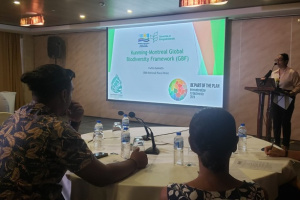Endangered species: New device "Nest" to help Nature Seychelles monitor turtle nesting

The device will allow conservationists to better understand what is happening to the hatchling and react to it. (Nature Seychelles/Facebook)
(Seychelles News Agency) - Environmental NGO Nature Seychelles has successfully completed the testing of a prototype device that will be used to monitor turtle nests in the future, said a top official.
The device, called 'Nest', is being developed in collaboration with a Seychellois company, OceanLabs. It will be able to monitor the nest's internal temperature, sea level and oxygen levels, among others, to help conservationists better protect sea turtles. The device was assembled with the off-the-shell parts in Mahe, the main island.
"One of the biggest factors that influences the sex of a turtle is the temperature. With the planet becoming warmer, it means that more turtles being born are turning out to be males and this is an issue," said Dr Nimal Shah, the chief executive of Nature Seychelles.
He explained that such a device will allow conservationists to better understand what is happening to the hatchling and react to it, such as finding ways to reduce the nest's temperature, to allow for more females to be born.
The prototype's testing was completed on Cousin Island, a granitic island lying 2 km west of Praslin, the second most populated island of Seychelles. It is a nature reserve managed by Nature Seychelles and protected under Seychelles law as a special reserve. It is one of the oldest marine protected areas in Seychelles.
"Cousin is a very important island when it comes to turtle nesting, especially hawksbills, where every year a large number of them come up to the island's beaches to nest. That is why the island was chosen to test the device," Shah explained to SNA.
The hawksbill sea turtle is classified on the Red List of the International Union for the Conservation of Nature (IUCN) as a critically endangered species. The species is largely limited to tropical and subtropical marine and estuary ecosystems.
The device is now ready to be produced and Shah said he hopes that with its success, it can then be mass produced and sold to other organisations around the world.
Aside from monitoring various areas of the nest, the device is also capable of motion detection, where it can then record everything that goes on around the nest and even let the rangers on the island know when the young turtles hatch and leave for the sea.
Shah told SNA about the plans to work with the same company, to come up with another piece of technology, aimed at the monitoring of coral reefs.
Nature Seychelles is a leading environmental organisation in the western Indian Ocean. It is the largest and oldest environmental NGO in the Seychelles archipelago, involved in environmental conservation and management. It employs 15 full-time staff including biologists, an economist, educators and protected area specialists.





